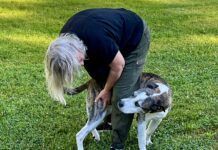
Earlier this week, I spent an hour with a lovely woman who bought an 8-week-old purebred puppy a month ago. She was at her wits’ end, she said. She wanted the puppy to stop constantly biting, stop digging in the backyard, stop jumping up on family members, and to stop grabbing things, like curtains and knickknacks on tables and shelves.
As I observed the puppy and surreptitiously worked to teach her to sit and lay down as I asked my client questions and listened to her describe all the things the puppy was doing that were vexing, I heard her say these things:
“Our last dog practically trained himself.”
“Our last dog never used his teeth on us, even as a very young puppy! This one draws blood on our arms or hands daily!”
“Our last dog would never dream of grabbing things off the side tables, or any table!”
“Our last dog was never a barker. Maybe one woof if someone was at the door, and that’s all.”
The “last dog” in question had died a few years ago, but his memory was alive and well—and was quite unfairly affecting my client’s relationship with this new puppy.
Maybe the last dog really was perfect—some dogs and puppies really are a dream, and adapt to life in our homes with hardly a toenail put wrong. But I tend to believe that by the time our dogs have lived a long life, and then passed away, we simply fail to remember any anxiety or trouble that they ever gave us. Oh, we may remember a funny quirk or two, something that they learned to do in a unique way, like barking at our laundry as it tumbled around in the glass-doored dryer, or chasing the shadows of passersby on the sidewalk at sunset, as those shadows are cast moving along our living room wall. These behaviors are remembered fondly, with humor—unlike the painful or messy behaviors we are dealing with our new naughty puppy. At some point, our “last dogs” become our sainted, perfect last dogs.
Here’s what I told my client: No dog is perfect. All dogs are different. This one is just a baby—and a stranger—whereas your “last perfect dog” was an adult with a long learning history that you’ve perhaps forgotten in the glow of your love for him and the pain of missing him.
I asked my client whether she had kids. Yes, two girls, she said, adults now. I asked, “Are they very different from each other?” She laughed and took the bait. “Oh my gosh yes,” she said. “One was solemn as a judge, it was like pulling teeth to get her to talk to me. The other one told me more than I ever wanted to know. When she called me from her honeymoon and said, ‘Mom, I have to tell you something,’ I told her ‘No! I don’t want to know!!’”
We had a huge laugh about that.
And then I brought her back to the puppy and Saint Last Dog. “Well, then, that’s how you know that we can’t blame this puppy for not being as easy as your last dog. She’s not a dud; I wouldn’t even say she’s naughty! But some dogs take more of our time and attention and patience to train than others, just like some of our kids take a lot longer and are harder to bring into responsible adulthood than others!”
Also, I told her, “All of the behaviors you described as so naughty are super typical puppy behaviors—and I can teach you how to manage them and direct her into behaviors you like better! But first we have to accept the idea that she’s actually quite a good puppy!” And by this time, I had the puppy offering sits and downs and lying calmly on the rug in front of us as we talked. I had started with using tiny bits of freeze-dried chicken treats to lure her into a down and then back up into sits, and then tossing the treats to send her away, and giving her tiny treats when she came back for more and sat politely without a lure. I hadn’t used a verbal cue, so the client barely noticed I was training her dog at all. And yet, there she was, lying quietly on the rug watching us.
She looked at the puppy as if she just noticed her there in the room for the first time. “My gosh!” she said. “How on earth did you do that?”
And with the discovery of the fact that this puppy, too, had the potential for greatness in her, we were able to get to work building the foundation of their new relationship—with no disrespect for the perfect last dog whatsoever.






I had to put my 16-year-old girl down 3 years ago and have not been able to get over the fact that I imagined she was ‘perfect’. But she was not! She was of course tough as a puppy! It was easier because I brought her to work for her first three years. She went through her stages of tearing toilet paper off the roll and eating poop at home. We sometimes remember the best and forget the worst.
Oh wow! I need to read this. We adopted a 5-year-old shih tzu poodle girl a month ago (mid-August) after saying goodbye to our 15-1/2 year old poodle mix girl the beginning of May. Our new girl doesn’t grasp that she can go outside whenever she needs to “by herself” to go potty using our electric dog door. Our previous girl picked it up in a DAY but she also had another dog to follow his lead. (Our new girl is the only dog but we do have a 20-year-old cat who now has doggy door privileges 24/7 since she can’t jump the fence anymore.)
I’m trying very hard to NOT do any comparisons because these are totally different dogs in personality, temperament, etc. 100% different, including their history before coming to our home, so I know my expectations should also be different.
Our new girl, Pippa, will go in and out the doggy door and she’ll use the ramp to get to the backyard with no problems. She just doesn’t grasp that she can independently go out. She doesn’t have to wait for me to take her outside. Then again, she’s probably had to wait for someone to take her out for the last five years. We’ve had her for 4 weeks. That’s okay though. I work from home and there isn’t a timeline on picking up on this. We’re still learning about each other.
Funnily enough, Nancy, I wrote a column for the Chico Enterprise about this very thing back in November of 2023…I called it “Great Expectations”!
My “sainted” dog was not perfect. I went to work with bites and scratches while he was learning how to be a good puppy. He was the runt and was pushed out by the mother and had to be bottle fed. He didn’t know about biting and hurting until I taught him. But, he was the smartest dog I have ever had. He learned to retrieve, catch a ball like an outfielder, and catch a frisbee. It wasn’t really hard to teach him. Our relationship was the best I ever had with a dog. He trusted me implicitly. Unfortunately, he got sick and died before he turned 3. I still miss him after 20 years.
I have never had a perfect dog, and my current dogs are not perfect. One has anxiety so bad she has to have Prozac to calm her down just a little bit. Any small, unexpected sound and she runs from the room. The other has separation anxiety that he manages himself, so far, by singing the blues when he is “deserted” for weeks (minutes) at a time.
I’ve had to remind myself more than once that just like everyone is different, so are dogs. It has helped me accept the challenges presented by my current English springer spaniel. Just because dogs are known to have certain traits, doesn’t mean they all do ❤️